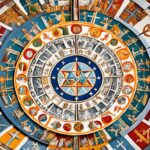Thinking about a church brings back memories from my childhood. I remember the smell of coffee and the sound of hymns. Church was more than a weekly stop. For me, it was a place of comfort, friendship, and a way to grow my faith.
Churches are not just buildings. They are calm places where people with similar values meet. They are homes for worship and spiritual guidance. Every church has its own special touch, customs, and community. Together, they form a rich fabric of faith around the world.
Key Takeaways:
- Christian denominations are separate organizations that share similar beliefs and practices.
- Different denominations have unique theological interpretations, rituals, and structures.
- Some well-known denominations include Roman Catholicism, Eastern Orthodoxy, and Protestantism.
- The traditions and practices of each denomination play a significant role in shaping their beliefs and worship styles.
- Each denomination offers its members a distinct perspective and experience of the Christian faith.
Understanding Denominations in Christianity
Christian denominations are like different branches of Christianity. Each has its own beliefs, practices, and ways of worshiping. These differences can include how they see special texts, what they believe about God, and their ideas on being saved. Each group gives a special view of the Christian faith to its members.
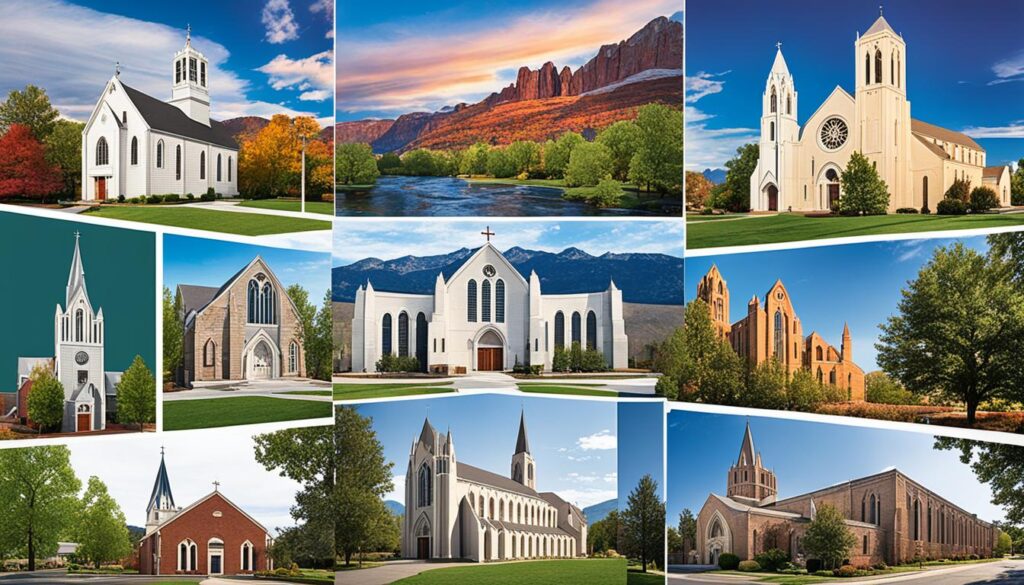
There are many traditions and ways of thinking in Christian denominations. They might do things differently in worship, in ceremonies, and even in reading the Bible. Even with these differences, they are all part of Christianity. This makes the Christian faith rich and colorful from within.
Different denominations make the Christian experience more personal. People can find a place that fits what they believe and how they like to worship.
One group might have a very traditional service, putting importance on rituals and special ceremonies. Others might be more laid back, focusing on personal connections with God and sharing that with their community. Some groups care a lot about helping others and making the world better, while others might focus more on each individual finding their own way to spiritual growth and being saved.
Each denomination’s beliefs and ways of worship come from its history, what they think the Bible means, and the cultures they’re in. This means that within Christianity, there are many ways to get closer to God. You can find a path that feels right for your spiritual journey.
The Role of Authority
In Christianity, who has the power can change. Some, like Catholics, follow the Pope and have a clear top-down system. Protestants focus on every person having a say and not one leader controlling everyone.
| Denomination | Beliefs | Practices | Ways of Worship |
|---|---|---|---|
| Roman Catholicism | Belief in the authority of the Pope and apostolic succession | Sacraments, veneration of saints, liturgical worship | Highly structured and formal |
| Eastern Orthodoxy | Belief in the authority of bishops and apostolic succession | Icon veneration, sacraments, liturgical worship | Liturgy with rich symbolism |
| Protestantism | Emphasize individual interpretation of Scripture | Variations in sacraments and practices | Diverse, ranging from traditional to contemporary |
| Lutheranism | Belief in justification by faith alone | Sacraments, liturgical worship | Structured with an emphasis on congregational singing |
The table shows some big differences in Christian groups. It shows how they look at faith and act on it.
Learning about other Christian groups helps us see the variety in our faith. It shows how broad and beautiful the Christian community is. Each group is unique but still shares big Christian ideas.
The Importance of Tradition in Denominations
Traditions are very important in the beliefs and customs of different Christian groups. These practices help in understanding and explaining holy texts and teachings. Each group sees the role of tradition differently but agrees it’s key in their beliefs.
“Tradition acts as a guide in our interpretation of sacred texts, offering us valuable insights into the beliefs and practices that have been passed down through generations,” explains Dr. Emma Thompson, a renowned theologian.
Each Christian group has its own way of practicing tradition. This can include how they worship, their special rituals, and even their prayers. These traditions come from many years ago and are linked to the history and culture of each group.
Interpretation of Sacred Texts
How Christian groups read and understand holy texts is tied to their traditions. The teachings and ideas of past church leaders and saints affect these beliefs. This means each group can see the Bible differently due to their traditions.
Dr. Jonathan Miller, known for his work in biblical studies, says, “Tradition shapes how we understand sacred texts. It adds the wisdom of those before us. This helps in dealing with hard theological ideas while staying true to the Bible.”
Using tradition, Christian groups discuss and argue over religious ideas. This leads to a wider view and better understanding of scripture.
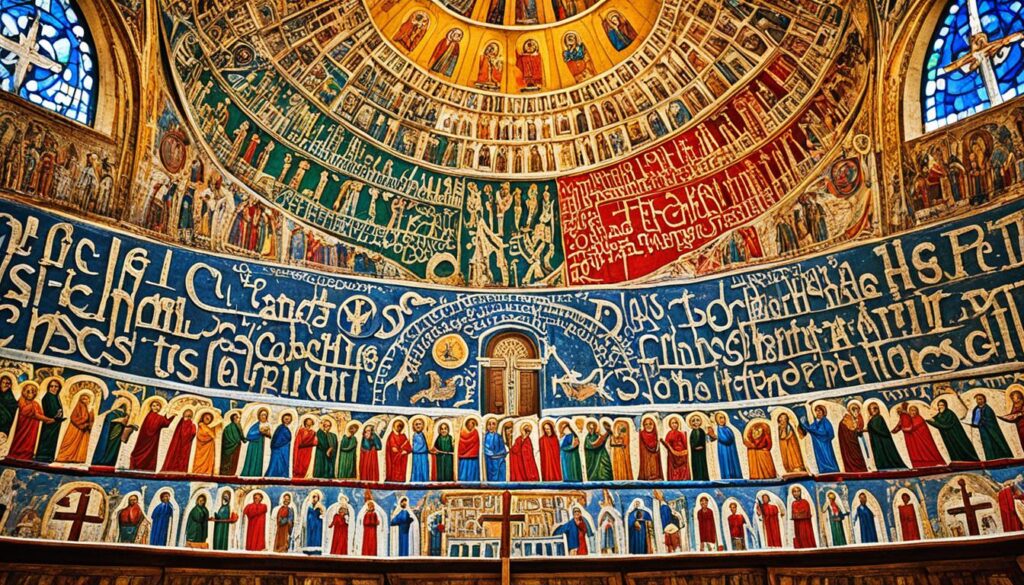
The Impact of Tradition on Worship and Practice
Tradition heavily impacts how different denominations worship. Many groups follow a set order of worship and have ritual prayers. This sense of order connects people to traditions that have lasted for centuries.
The ceremonies, like baptism and the Eucharist, are very important. Each group understands these acts differently, based on their beliefs. For example, some view the Eucharist as the real presence of Christ, while others see it as only a remembrance.
Embracing the Richness of Tradition
Although tradition is crucial in Christian groups, they must also look to the future. They keep their ways of worship and beliefs up to date while respecting traditions. This is done through ongoing discussions and prayers.
“Theological views are always changing, evolving with the world,” says Dr. Thompson. “Tradition gives a base, but it should not block new ideas or stop us from exploring the changing world.”
Christian groups work to blend old traditions with new ways of understanding the Bible. This makes for a faith that is both deep-rooted and flexible in today’s world.
| Traditions in Denominations | Examples |
|---|---|
| Liturgical Worship |
|
| Sacramental Practices |
|
| Prayers to Saints |
|
| Veneration of Icons |
|
The Roman Catholic Church
The Roman Catholic Church is a big part of Christianity worldwide. It started with the teachings of Jesus and Saint Peter. The Pope leads the Church as Saint Peter’s successor. For centuries, the Church has guided its followers with its beliefs and practices.
Catholics focus on special, structured prayers and worship. They see the Mass, or Eucharist, as most important, where they remember Jesus. This happens in Catholic churches everywhere, regularly.
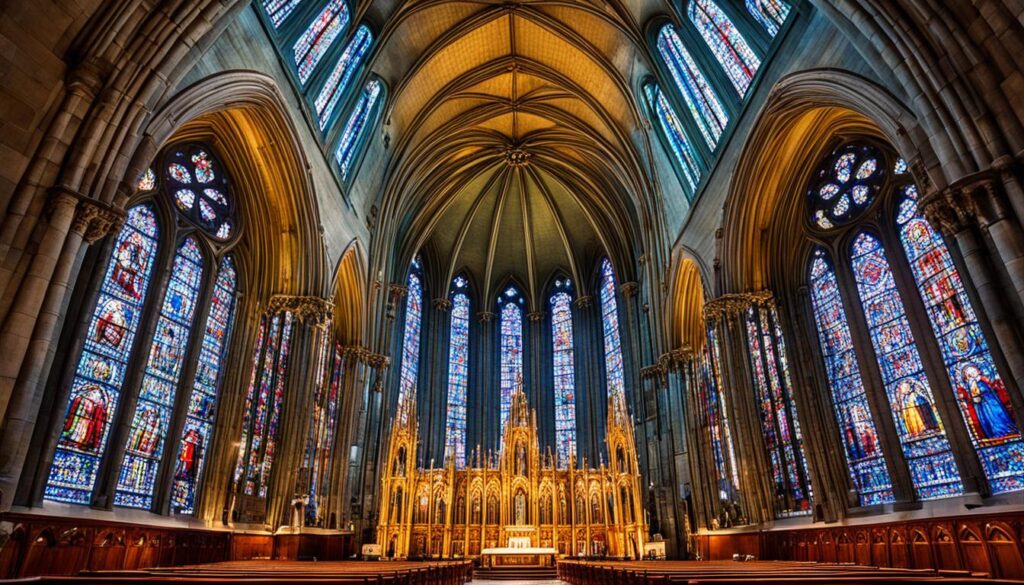
For Catholics, sacraments are essential ways God shows grace visibly. There are seven sacraments, like Baptism and the Eucharist. Each one is a special way to connect with God and to bless
Authority is crucial in the Roman Catholic faith, with the Pope at the top. Catholics believe in his infallibility when he addresses faith and morals. They see him as a guide, reflecting God’s wisdom.
“The Roman Catholic Church has a rich tradition that emphasizes the importance of liturgical worship, the sacraments, and the authority of the Pope. It offers a distinct spiritual experience for its followers, inviting them to participate in the life and teachings of Jesus Christ.”
Catholic beliefs and worship styles can be different by area and culture. Yet, certain key beliefs unite Catholics worldwide. This unity in diversity creates unique ways of celebrating faith.
| Beliefs | Practices | Sacraments | Authority |
|---|---|---|---|
| The belief in the Holy Trinity and the divinity of Jesus Christ | Liturgical worship, prayer, devotion to saints, use of sacramentals | Baptism, Confirmation, Holy Eucharist, Reconciliation, Anointing of the Sick, Holy Orders, Matrimony | Ultimate authority of the Pope, the Magisterium, and Apostolic succession |
The Roman Catholic Church remains an important anchor for many worldwide. It offers support, a place to worship, and community for millions.
The Eastern Orthodox Church
The Eastern Orthodox Church is a big group of Christians. It is known for its deep traditions and special way of worship. It comes from the Byzantine Empire, so it has its own unique culture and beliefs.
One big thing the church focuses on is icons. These are holy pictures used in worship. Icons help believers feel close to God and important religious events. They are a key part of the church’s way of worship.
This church also cares a lot about sacraments. These are special ceremonies that bring believers closer to God. For example, baptism and the Eucharist are seen as ways to feel God’s love. They are central to the church’s faith.
The Eastern Orthodox Church is different from other Christian groups. It doesn’t have one main leader like a pope. Instead, a group of bishops works together to lead the church. They decide on what the church believes and does.
The Communion of Saints
An important belief in the Eastern Orthodox Church is the idea of the communion of saints. This means all believers are spiritually connected, even those who have died. They think that saints in heaven are still praying for and helping those on earth in their faith journey.
“In the Eastern Orthodox Church, icons are not merely decorations but windows to the divine.” – Eastern Orthodox believer

Protestant Denominations
In the 16th century, the Protestant Reformation shaped Christianity. Various groups like Lutherans, Methodists, Baptists, and Reformed churches started. They taught that everyone should read the Bible for themselves. They also believe in having faith in Jesus for saving us, sola scriptura.
Protestantism is a wide field with different beliefs and ways of worship. Despite their shared origins, each denomination has its unique views and systems.
“The Reformation changed Christianity greatly. It gave birth to many Protestant groups that questioned the old ways of the Catholic Church.” – Reformation scholar
Protestants value the Bible’s authority and the role of personal faith. They teach that individuals can connect with God without anyone in the middle.
Even though they worship in different ways, Protestants agree on spreading Christ’s message. They believe in showing their faith through actions every day.
Diverse Protestant Denominations
Protestantism includes many groups, each with unique beliefs and traditions. For example, Lutherans often use traditional worship. Baptists, however, prioritize a lively and shared worship experience.
Methodists focus on being holy in personal life and in helping others. The Reformed, following John Calvin, believe in God’s rule and predestination.
With many options, Protestants provide a place for every person to feel at home in their faith community.
Understanding Protestant Diversity
Let’s look at Lutheranism, Methodism, and Baptists for a closer view of Protestant diversity.
| Lutheranism | Methodism | Baptists |
|---|---|---|
| Belief in sacraments and liturgical worship. | Emphasis on personal and social holiness. | Belief in the autonomy of local churches and believer’s baptism. |
| Authority of Scripture and the teachings of Martin Luther. | Influence of John Wesley’s teachings on sanctification. | Rejection of infant baptism and emphasis on adult baptism by immersion. |
| Strong emphasis on grace and justification by faith alone. | Commitment to social justice and community involvement. | Focus on personal faith and the believer’s relationship with God. |
Lutheranism, Methodism, and Baptists are just a few examples. They show how varied Protestant beliefs and practices can be.
But all Protestants aim to keep the spirit of the Reformation alive. They stress the importance of personal Bible study and faith in Jesus.
The Lutheran Church
The Lutheran Church started with Martin Luther’s teachings during the Protestant Reformation. It believes people are saved by faith in Jesus alone. Lutherans focus on this key idea, setting them apart from other Christians.
They think the Bible is essential and see it as God’s own words. Martin Luther championed Bible translation into everyday language. This allowed more people to read and learn from the Bible.
Sacraments in the Lutheran faith play a big role in how they receive God’s grace. Baptism welcomes people into the faith, whether they’re babies or adults. The Lord’s Supper is also vital, as people share in Jesus’ sacrifice.
Lutherans have some differences in what they believe, depending on their local church. This can include views about the Eucharist, like Christ’s real presence or it being symbolic.
Services in Lutheran churches can be very traditional or mix in some newer elements. Singing hymns and all churchgoers participating are a big part of their worship.
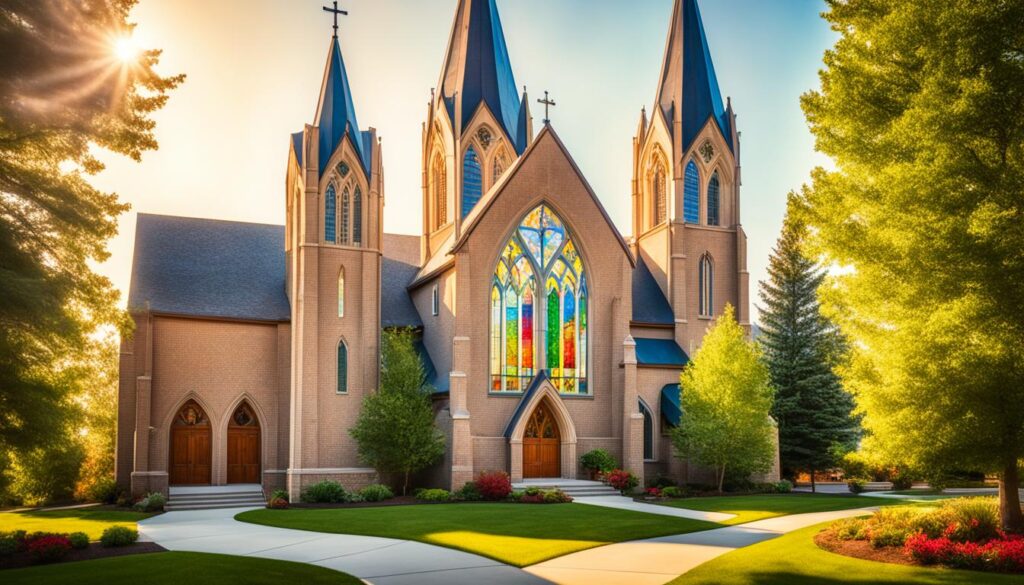
“The Lutheran Church believes in the priesthood of all believers, affirming that every individual has direct access to God through Jesus Christ. This belief underscores the importance of personal faith and a direct relationship with God.”
The Lutheran Church has made a big impact in Christian history and worldwide. It focuses on teaching, helping people, and believing in a close relationship with God. It holds the Bible’s authority and these core teachings as very important.
Baptist Denomination
The Baptist denomination is a unique type of Christianity. It puts a lot of importance on the Bible’s teachings. It also says having strong faith in Jesus is key. Baptists believe in baptizing people who choose to follow Jesus. They think this should happen only after a person has decided to believe, not as a baby.
Baptists think that each local church should be its own boss. This means no higher church leaders tell them what to do. The members of each church have a big say in how things are run. This gives everyone a chance to help make decisions for the church.
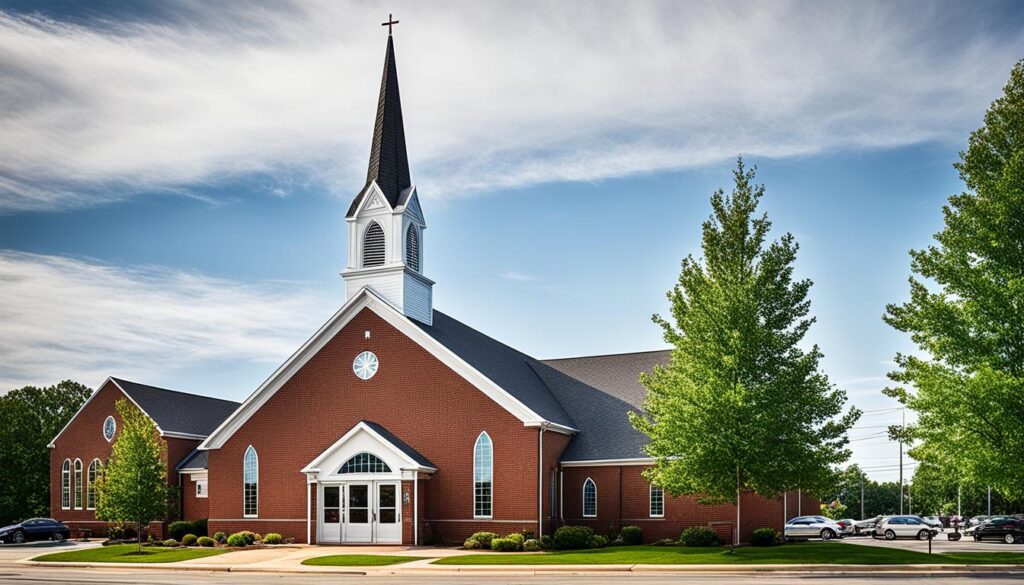
“The Baptist denomination celebrates the freedom and responsibility of individual believers to interpret the Bible and make decisions within the context of their local church.” – Baptist Beliefs and Practices
Baptists love the Bible and believe deeply in having a personal relationship with Jesus. They try to get closer to Jesus in many ways. This includes going to church, being in small groups, and helping with church projects and missions.
Baptist Worship
In Baptist services, you’ll hear a lot of singing and Bible talks. Music is a big deal, with old hymns and new songs sung to praise God. The talks are all about what the Bible says and how it matters in daily life.
To sum up, Baptists show their beliefs by baptizing those who choose, having each church govern itself, and trusting the Bible. They believe faith is personal yet also about being part of a church family. This reflects their views on faith, community, and the Bible.
Reformed Churches
Reformed churches, known as Calvinist, follow John Calvin’s teachings. They focus on God’s control, predestination, and the Bible’s authority. These churches think God has already picked who gets saved. They say God controls everything and knows all.
Reformed churches see the Bible as the top authority for faith. They see it as God’s true word. They follow John Calvin’s teachings on the Bible.
Reformed churches’ worship styles are not all the same. Some use traditional services with hymns and set rituals. Others have more modern worship with new music. Yet, in all styles, they worship to show God’s glory and power.
“The Reformed tradition believes strongly in God’s control and predestination. This impacts how these churches view the world and their place in it.”
The Five Points of Calvinism
Calvinism is known for the Five Points, shown by the TULIP acronym:
- Total depravity: Everyone is born sinning and can’t save themselves.
- Unconditional election: God picks who gets saved without looking at their actions or worth.
- Limited atonement: Jesus died for those God chose to save.
- Irresistible grace: Those God picked for salvation can’t turn down His grace.
- Perseverance of the saints: The people God saves will keep believing until the end.
These ideas are key to Reformed churches and how they see salvation and life in Christ.
| Key Beliefs | Reformed Churches | Calvinism |
|---|---|---|
| Sovereignty of God | Emphasized | Central |
| Predestination | Believed | Believed |
| Authority of Scripture | Upheld | Upheld |
| Salvation by Grace | Emphasized | Emphasized |
| Worship Styles | Varied | N/A |
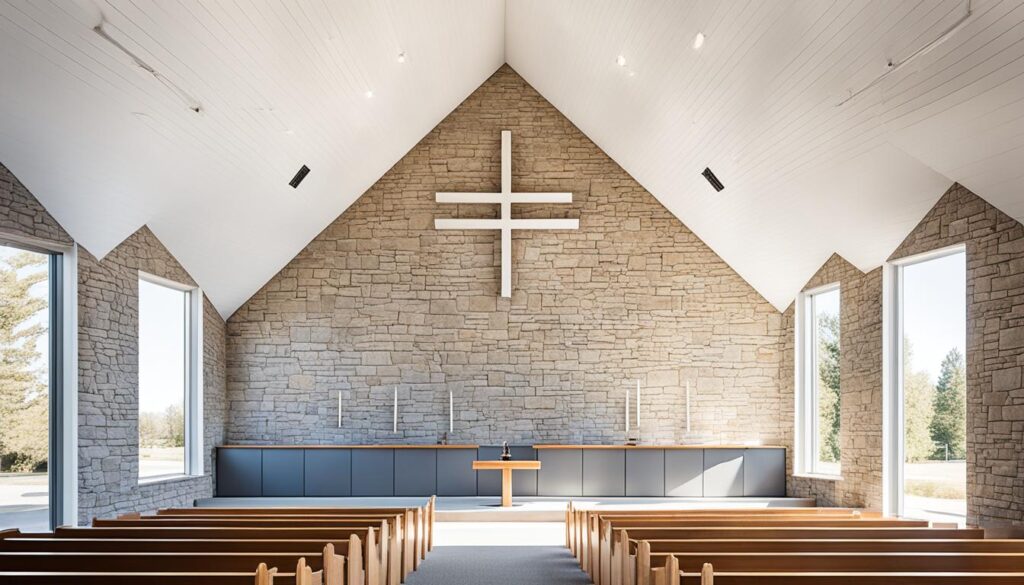
Reformed churches are still important today, with millions as followers worldwide. They stand by God’s power, predestination, and the Bible. This guides their view of God’s plan and their part in it.
Anglican Communion
The Anglican Communion is like a worldwide family of churches. It all starts with the Church of England. They follow a set way of worship and often use the Book of Common Prayer.
The family has a lot of variety in how they believe and practice. Some are more traditional, and some are more open. They all cherish their old faith stories and apply them to today. 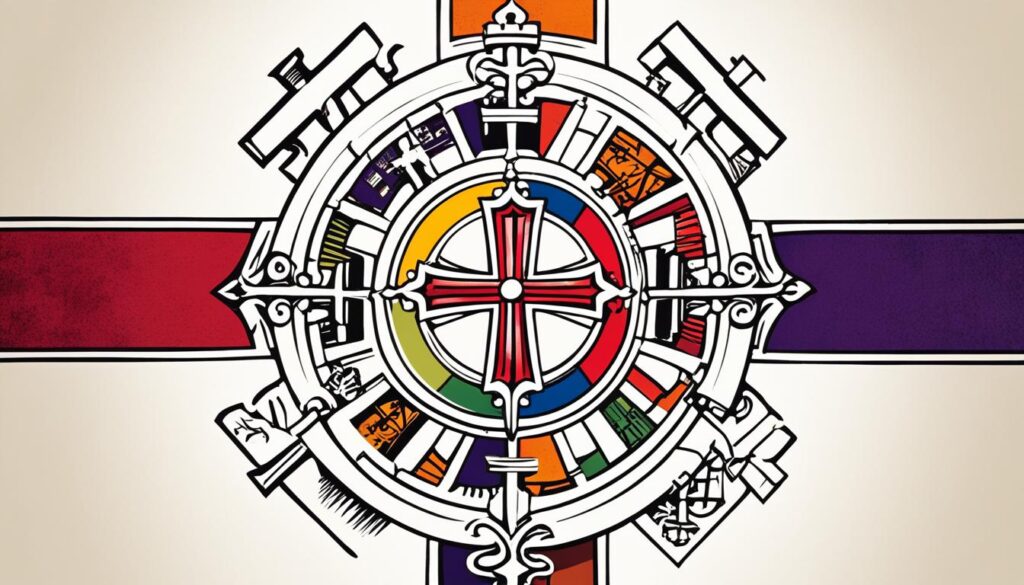
This family is very welcoming and has many different ideas about God’s work. Each area can choose how to follow their faith. They might do things differently, but they stay together.
In their worship, they honor two important moments: baptism and Holy Communion. These are bigger than just rituals. They show everyone God’s love and care.
“The Anglican Communion is like a beautiful tapestry, woven together by diverse threads of faith and tradition, creating a vibrant and inclusive community of believers.”
Anglicans believe in being together, not only in thinking and doing the same things. They focus on building strong relationships and talking with honesty. Through this, they work hard for fairness and peace everywhere.
The Methodist Church
John Wesley started the Methodist Church. It’s all about being close to God personally and helping others. Believe in Jesus is important for Methodists because it brings you closer to God.
They work hard to follow Jesus in everything they do. This makes them different from other groups.
The Methodist Church loves to help people. They believe in fairness for everyone. This is thanks to Wesley, who thought we should treat all people well.
They help those who need it most and try to fix unfair rules.
“Do all the good you can, by all the means you can, in all the ways you can, in all the places you can, at all the times you can, to all the people you can, as long as ever you can.” – John Wesley
Helping others and connecting with God are key for Methodists. Their lives should show their faith and help make the world better.
The Concept of Sanctification
Sanctification is about growing to be more like Christ. This means getting better and better. It’s a life-long process.
To become more like Christ, Methodists pray, read the Bible, and talk with other believers. They try to think, feel, and act like Jesus did.
Social Justice and Community Involvement
Methodists have always cared about fairness and kindness. They work hard to make their communities better.
They might help at food banks or work to change unfair laws. They believe in making the world a better place.
Methodist Church Beliefs and Practices
| Beliefs | Practices |
|---|---|
| Justification by faith: Belief that salvation is received through faith in Jesus Christ alone. | Worship: Regular participation in communal worship services, including prayers, singing, and Scripture readings. |
| Sanctification: Belief in the ongoing process of spiritual growth and becoming more like Christ. | Sacraments: Observance of baptism and the Eucharist (or Holy Communion) as means of grace. |
| Social Justice: Commitment to addressing social inequality and working towards a more just society. | Community Involvement: Engaging in volunteerism, charity work, and advocacy for marginalized communities. |
Methodists show their faith in how they live. They want to show the love of Jesus by making the world a better place.
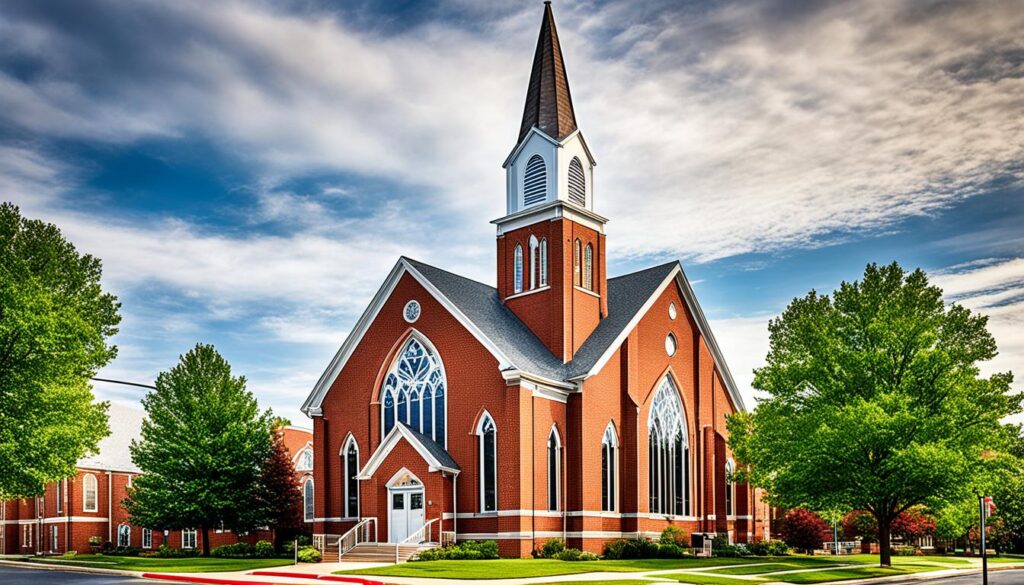
Presbyterians and Reformed Churches
The Presbyterian Church and Reformed churches are rooted in Calvinism. This is a part of the Protestant movement that started during the Reformation. They believe in the importance of the Bible, predestination, and that God is in control of everything.
Their main difference is how they run their churches. Presbyterians use a system where chosen elders help guide the church. This shows the value they put on teamwork and shared leadership.
Reformed churches, in comparison, include a wider range of groups who share Calvinist beliefs. They might do things a bit differently but they all base their actions on the same theological ideas. These ideas focus on God’s power, the sinfulness of humans, and the path to salvation through Christ.
Both types of church really care about learning and thinking about the Bible. They want their members to be able to talk about their faith with others. This way, their faith becomes stronger and clearer.
“Educating and thinking are key for Presbyterians and Reformed churches. We encourage exploring the Bible and asking questions. Pushing for knowledge is a big part of our journey.” – Reverend Mary Thompson, Presbyterian Church.
Presbyterians and Reformed churches also look beyond just their own groups. They believe it’s key to connect with God, build strong faith groups, and take part in wider community issues. They work for fairness, help those in need, and take care of the world we live in.
Showing all this, the Presbyterian Church and Reformed churches are not just about their history. They still make a real difference in the lives and neighborhoods they are part of. They value faith, how they are run, and the way they serve.
Other Christian Denominations
Christianity has many groups with different beliefs and ways of worship. They make the Christian faith vibrant and varied. Let’s look at some denominations.
Pentecostal Denominations
Pentecostals focus a lot on the Holy Spirit’s role in believers’ lives. They think getting the Holy Spirit’s power, like speaking in tongues, is crucial. Their church services are lively, filled with songs, prayers, and they welcome supernatural events.
Adventists
Adventists, including the Seventh-day Adventists, are very interested in Jesus’ second coming. They honor Saturday as the day of rest, pointing to the fourth commandment. They also stress living healthily, which for them, means being vegetarian.
Episcopalians
Episcopalians are linked to the Anglican Church founded in England. They love using set prayers and focus on doing sacraments like baptism. Their church leaders are bishops, who have a big part in how the church is run.
Quakers
Quakers, also known as the Friends, have a quiet and direct way of worship. They aim to hear God in silent meetings. They are big on peace, equality, and simple living, preferring dialogue over conflict.
These few groups capture the variety in Christian worship today. Every denomination adds its unique touch to Christianity, creating a colorful picture.
Implications for Personal Life and Society
The many churches and groups in Christianity impact both people and society. They influence how individuals believe and worship. This then affects their work to help others and join their community. Denominations also guide how people practice their faith and help in social issues.
Shaping Personal Faith
Different groups in Christianity can deeply change how a person understands their faith. For example, the Eastern Orthodox Church has its own way of worship. Protestants focus on a personal connection to Jesus. Roman Catholics follow the Pope’s teachings. These differences shape spiritual beliefs and what people do in daily life.
“Denominational differences provide individuals with a distinct lens through which they can explore and express their faith. It allows for a diversity of experiences and approaches to spirituality, catering to a range of personal preferences and beliefs.”
Worship, Community Engagement, and Society
How and why people worship varies between denominations. They each have unique traditions and ways of praying. This can include services, rituals, or other practices. The type of worship helps connect people within their faith community.
Denominations often start projects to help the poor, fight for justice, and protect the environment. They support aid programs, schools, and more. By working together, they make their community and world better.
Uniting Diverse Perspectives
Even with their differences, denominations add to the beauty of Christianity. They bring their own beliefs and customs. These create chances for people to talk and learn. Despite these variations, all Christians share faith in Jesus Christ. This common ground helps bring them together as one community.
By welcoming these differences, understanding Christianity becomes richer. It creates a spiritual world where everyone can learn and grow. This benefits both individuals and communities.
Conclusion
Christian denominations offer a rich variety of faith, beliefs, and practices within Christianity. Each one has its unique view and understanding of the Christian faith. They add richness to the religious world. Even though they differ in thoughts, ways of worship, and rituals, they all aim to serve and praise God. They work to share the love of Christ.
This variety lets people pick a denomination that matches their beliefs. It makes their spiritual journey meaningful. It also creates a lively religious community where people share and learn from each other. This way, Christianity keeps growing and changing to meet the needs of its followers.
By welcoming the many expressions of faith in Christian denominations, we honor the depth of the Christian tradition. We see how unity within this diversity makes us strong. No matter the differences between us, all Christians have the same base in Christ. We are all asked to show our faith through love and helping others. In a world that connects us more than ever and celebrates many beliefs, Christian diversity highlights the varied ways humans find spirituality. It also shows the value of respecting and talking to each other.

